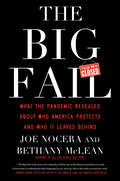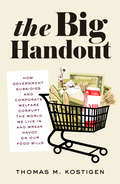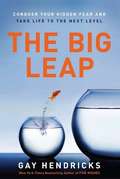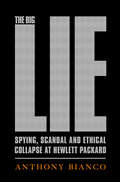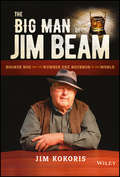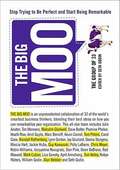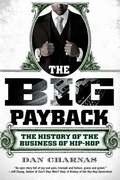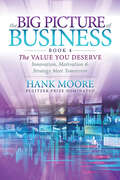- Table View
- List View
The Big Eight
by Mark StevensProvides an inside look at eight of the most influential accounting firms in the United States, examining their pivotal roles in the world of national and international finance.
The Big Enough Company
by Amy Abrams Lancaster AdelaideAfter initially launching their company, small business owners are bombarded with a flurry of 'advice' on how to grow fast, be more profitable amd imitate other successful start ups. But, as this guide demonstrates, those tips often fail to consider the astounding variety of needs, motivations and goals that each entrepreneur has for starting a business. This title empowers those individuals to ignore popular 'wisdom' and take charge of their business in a way that helps them to succeed in thier own way.
The Big Fail: What the Pandemic Revealed About Who America Protects and Who It Leaves Behind
by Joe Nocera Bethany McLeanFrom the collaborators behind the modern business classic All the Devils are Here comes a damning indictment of American capitalism—and the leaders that left us brutally unprepared for a global pandemicIn 2020, the novel coronavirus pandemic made it painfully clear that the U.S. could not adequately protect its citizens. Millions of Americans suffered—and over a million died—in less than two years, while government officials blundered; prize-winning economists overlooked devastating trade-offs; and elites escaped to isolated retreats, unaffected by and even profiting from the pandemic.Why and how did America, in a catastrophically enormous failure, become the world leader in COVID deaths? In this page-turning economic, political, and financial history, veteran journalists Bethany McLean and Joe Nocera offer fresh and provocative answers. With laser-sharp analysis and deep sourcing, they investigate both what really happened when governments ran out of PPE due to snarled supply chains and the shock to the financial system when the world's biggest economy stumbled. They zero in on the effectiveness of wildly polarized approaches, with governors Andrew Cuomo of New York and Ron DeSantis of Florida taking infamous turns in the spotlight. And they trace why thousands died in hollowed-out hospital systems and nursing homes run by private equity firms to &“maximize shareholder value." In the tradition of the authors&’ previous landmark exposés, The Big Fail is an expansive, insightful account on what the pandemic did to the economy and how American capitalism has jumped the rails—and is essential reading to understand where we&’re going next.
The Big Fix
by Brett ForrestCan the most beloved sport in the world beat the corruption that threatens to tear it apart?Known as the "beautiful game," soccer is the world's most popular sport, crossing borders and language barriers to entertain billions. But underneath it all--the raucous fans in the stadiums; the beloved players; and FIFA, the international governing body with a membership of 209 national associations--is a scandal that threatens to make soccer the ugliest sport in the world. An underworld of international gambling rings, corrupt players and officials, and shadowy figures preys on the far-flung edges of the game, making match-fixing in soccer one of organized crime's new, profitable businesses. Now, for the first time, journalist Brett Forrest takes us inside the $700 billion international soccer betting market. In 2013 Europol revealed that more than 700 international matches have been fixed since 2008. Forrest pulls back the curtain, exposing a web of nefarious dealings across the world, even on U.S. soil, with opportunistic fixers bribing players, influencing officials, and staging fake matchups, while Asian criminal syndicates pull the strings. No match is safe--not even the World Cup tournament--especially while local law enforcement officials lack the resources and the will to investigate. But one man has taken on this criminal enterprise: Chris Eaton, a hardheaded Australian, longtime Interpol director, and the former head of security for FIFA. Forrest follows Eaton's journey from local beat cop to FIFA's security chief for the 2010 World Cup in South Africa. It was at this competition that Eaton first grasped the extent of match-fixing and the threat it posed to the game. From that point on, Eaton made it his mission to track down the elusive perpetrators: fixers who shed identities, crisscross borders, and target players and clubs on behalf of international criminal syndicates. Filled with headline-making revelations, The Big Fix is a must-read for soccer fans and true crime aficionados. The story brings us inside Chris Eaton's hunt for the world's biggest fixers and their backers--from the roots of fixing in Singapore and Kuala Lumpur, to FIFA headquarters in Zurich and World Cup preparation in South Africa and Qatar, to fixing's expansion into nearly every country in the world--and the fight to save the beautiful game.
The Big Fix: Seven Practical Steps to Save Our Planet
by Hal Harvey Justin GillisAn engaging, accessible citizen&’s guide to the seven urgent changes that will really make a difference for our climate—and how we can hold our governments accountable for putting these plans into action.Dozens of kids in Montgomery County, Maryland, agitated until their school board committed to electric school buses. Mothers in Colorado turned up in front of an obscure state panel to fight for clean air. If you think the only thing you can do to combat climate change is to install a smart thermostat or cook plant-based burgers, you&’re thinking too small. That&’s where The Big Fix comes in, offering everyday citizens a guide to the seven essential changes our communities must enact to bring our greenhouse gas emissions down to zero—and sharing stories of people who are making those changes reality. Energy policy advisor Hal Harvey and longtime New York Times reporter Justin Gillis hone in on the seven areas where ambitious but eminently practical changes will have the greatest effect: electricity production, transportation, buildings, industry, urbanization, use of land, and investment in promising new green technologies. In a lively, jargon-free style, the pair illuminate how our political economy really works, revealing who decides everything from what kind of power plants to build to how efficient cars must be before they&’re allowed on the road to how much insulation a new house requires—and how we can insert ourselves into all these decisions to ensure that the most climate-conscious choices are being made. At once pragmatic and inspiring, The Big Fix is an indispensable action plan for citizens looking to drive our country&’s greenhouse gas emissions down to zero—and save our climate.
The Big Fix: The Hunt for the Match-Fixers Bringing Down Soccer
by Brett Forrest<p>Can the most beloved sport in the world beat the corruption that threatens to tear it apart? <p>Known as the "beautiful game," soccer is the world's most popular sport, crossing borders and language barriers to entertain billions. But underneath it all--the raucous fans in the stadiums; the beloved players; and FIFA, the international governing body with a membership of 209 national associations--is a scandal that threatens to make soccer the ugliest sport in the world. An underworld of international gambling rings, corrupt players and officials, and shadowy figures preys on the far-flung edges of the game, making match-fixing in soccer one of organized crime's new, profitable businesses. <p>Now, for the first time, journalist Brett Forrest takes us inside the $700 billion international soccer betting market. In 2013 Europol revealed that more than 700 international matches have been fixed since 2008. Forrest pulls back the curtain, exposing a web of nefarious dealings across the world, even on U.S. soil, with opportunistic fixers bribing players, influencing officials, and staging fake matchups, while Asian criminal syndicates pull the strings. <p>No match is safe--not even the World Cup tournament--especially while local law enforcement officials lack the resources and the will to investigate. But one man has taken on this criminal enterprise: Chris Eaton, a hardheaded Australian, longtime Interpol director, and the former head of security for FIFA. Forrest follows Eaton's journey from local beat cop to FIFA's security chief for the 2010 World Cup in South Africa. It was at this competition that Eaton first grasped the extent of match-fixing and the threat it posed to the game. From that point on, Eaton made it his mission to track down the elusive perpetrators: fixers who shed identities, crisscross borders, and target players and clubs on behalf of international criminal syndicates. <p>Filled with headline-making revelations, <i>The Big Fix</i> is a must-read for soccer fans and true crime aficionados. The story brings us inside Chris Eaton's hunt for the world's biggest fixers and their backers--from the roots of fixing in Singapore and Kuala Lumpur, to FIFA headquarters in Zurich and World Cup preparation in South Africa and Qatar, to fixing's expansion into nearly every country in the world--and the fight to save the beautiful game.
The Big Four: The Curious Past and Perilous Future of the Global Accounting Monopoly
by Ian D. Gow Stuart Kells"Messrs. Gow and Kells have made an invaluable contribution, writing in an amused tone that nevertheless acknowledges the firms' immense power and the seriousness of their neglect of traditional responsibilities. 'The Big Four' will appeal to all those interested in the future of the profession--and of capitalism itself." —Jane Gleeson-White, Wall Street JournalWith staffs that are collectively larger than the Russian army and combined revenues of over $130 billion a year, the Big Four accounting firms—Deloitte, PricewaterhouseCoopers, Ernst & Young, and KPMG—are a keystone of global commerce. But leading scholar Ian Gow and award-winning author Stuart Kells warn that a house of cards may be about to fall.Stretching back to the Medicis in Renaissance Florence, this book is a fascinating story of wealth, power, and luck. The founders of the Big Four lived surprisingly colorful lives. Samuel Price, for example, married his own niece. Between the world wars, Nicholas Waterhouse collected postage stamps while also hosting decadent parties in his fashionable London home. All four firms have endured major calamities in recent decades. There have been hundreds of court cases and legal prosecutions for failed audits, tax scandals, and breaches of independence. The firms have come so close to "extinction level events" that regulators have required them to prepare "living wills." And today, the Big Four face an uncertain future—thanks to their push into China, their vulnerability to digital disruption and competition, and the hazards of providing traditional services in a new era of transparency. This account of the past, present, and likely future of the Big Four is essential reading for anyone perplexed or fascinated by professional services, working or considering working in the industry, or simply curious about the fate of the global economy.
The Big Handout: How Government Subsidies and Corporate Welfare Corrupt the World We Live In and Wreak Havoc on Our Food Bills
by Thomas M. KostigenJust reading the word "subsidies" may cause many people's eyes to glaze over. We don't think it affects us directly, so we tune out. But it turns out that this complicated-sounding issue has an enormous impact on all of us. The Big Handout is about bad fiscal, environmental, agricultural, water, energy, health, and foreign policies. And it's a story about just one thing—subsidies.A subsidy is a grant by the government to a private business that is deemed advantageous to the public. Cotton, wheat, corn, soy, and oil are the most subsidized commodities in the United States. In this eye-opening book, New York Times bestselling author Thomas Kostigen explores government policies that cost taxpayers $200 billion per year, over $1,500 per household. In some cases we pay more for subsidized goods than we'd pay in a free market—and, in the most shocking abuses of the subsidy system, we pay for goods that aren't even produced.The Big Handout exposes how artificial pricing hurts us and people worldwide, from our waistlines and pocketbooks to our health. By revealing just how toxic America's subsidy system has become, for everyone, The Big Handout is a wake-up call that empowers readers to effect change.
The Big Idea: How to Make Your Entrepreneurial Dreams Come True, from the Aha Moment to Your First Million
by Donny DeutschIt's the moment when you say, "There's gotta be a better way." It's the moment when you ask, "How can I solve this problem?" Donny Deutsch's hit CNBC show The Big Idea has put the spotlight on that ordinary moment and the people who have the courage and stamina to make their dreams come true. Some people think a big idea is like a lightning bolt striking out of the blue that slams you in the head. But it's hardly ever like that. The big idea isn't an act of God. It's an act of daily life. Simply put, the idea that will make millions starts with an observation. A carpenter gets tired of almost losing a finger every time he slices a bagel. Bam! The Bagel Guillotine. A mother is frustrated that her pantry is full of stale food because the packages don't close. Bam! Quick Seals. Howard Schultz notices on a trip to Italy that there are coffee bars on almost every corner. Bam! Starbucks. None of them had a barrel of cash. None of them had a ton of experience. They had a big idea and the will to follow through. In The Big Idea, Deutsch draws not only on his own tremendous focus and expertise, but on that of dozens of the successful entrepreneurs whom he has interviewed, to help you create your own enterprise. From the "Gut Check Moment" to "Mom Power," The Big Idea takes aspiring entrepreneurs along every step of the way. The Big Idea is your road map to the American dream.
The Big Investment Lie: What Your Financial Advisor Doesn't Want You to Know
by Michael EdesessThe investment advice and management industry is built on fraud: the idea that professional advisors can predictably and consistently help you get a better rate of return on your investments. The industry sells us on this lie using manipulative tactics that are studied, refined, Wall Street minted, and Madison Avenue packaged. And extraordinarily effective. Here, Michael Edesess exposes the shocking truth that, in fact, behind the success of nearly every prosperous investment professional lies not the ability to procure higher rates of return on investment for his or her clients but the ability to procure astoundingly high fees from those clients and nothing more. Through fascinating and sometimes humorous anecdotes and straightforward explanations of investment theory and scientific evidence, Edesess reveals just how badly investors are being scammed by The Big Investment Lie. He examines how the master salespeople that make up the industry sell their cleverly concocted distortions of truth--to the tune of $200 billion a year--to unsuspecting consumers who swallow them hook, line and sinker. He then shines a spotlight on the true cost of the industry's useless advice, showing that a prudent independent investor, following a conservative strategy, can reap anywhere from 40 percent to over 100 percent more than an investor who falls for The Big Investment Lie. Detailing the Ten New Commandments for Smart Investing--practical advice for how, where, and when to invest your money to maximize wealth--The Big Investment Lie provides the guidance you need to secure your financial future without throwing your hard-earned money away on the fraudulent investment advice industry.
The Big Leagues Go to Washington: Congress and Sports Antitrust, 1951-1989
by David George SurdamBetween 1951 and 1989, Congress held a series of hearings to investigate the antitrust aspects of professional sports leagues. Among the concerns: ownership control of players, restrictions on new franchises, territorial protection, and other cartel-like behaviors. In The Big Leagues Go to Washington, David Surdam chronicles the key issues that arose during the hearings and the ways opposing sides used economic data and theory to define what was right, what was feasible, and what was advantageous to one party or another. As Surdam shows, the hearings affected matters as fundamental to the modern game as broadcasting rights, player drafts and unions, league mergers, and the dominance of the New York Yankees. He also charts how lawmakers from the West and South pressed for the relocation of ailing franchises to their states and the ways savvy owners dodged congressional interference when they could and adapted to it when necessary.
The Big Leap: A Guide to Freelancing for Creatives
by Martina FlorDitch your nine-to-five and become your own boss with this insider's guide to freelancing from Martina Flor, a leading designer, educator, author, and entrepreneur. The Big Leap covers all aspects of starting your own business, from practical skills like identifying potential clients and pricing projects to important big-picture topics like managing time and finances, diversifying income streams, and taking care of your most important tool—you!Flor demonstrates each concept with helpful case studies pulled from her own journey from freelance designer to influential, international business owner. Creatives across disciplines will benefit from this thorough and easy-to-follow career guide, including designers, illustrators, photographers, programmers, writers, and editors.
The Big Leap: Conquer Your Hidden Fear and Take Life to the Next Level
by Gay HendricksHendricks shows readers how to eliminate the barriers to success by overcoming fears and, in the process, find an extraordinary life.
The Big Lie: Spying, Scandal, and Ethical Collapse at Hewlett Packard
by Anthony BiancoHewlett Packard is an American icon, the largest information technology company in the world. The bedrock of Silicon Valley, it employs more than 300,000 people, its market capitalization is in excess of $100 billion and its products are in almost every home in the country where there is a printer or computer. In 2003 the company began a transition from the family management style of its founders. It made a bold statement by hiring as its new CEO the most visible female business executive in America: Carly Fiorina. Less than two years later, the board fired her, amid accusations of imperiousness that had begun damagingly to leak into the business media. The board at that time included one of Silicon Valley's most flamboyant venture capitalists and owner of the largest and most expensive yacht in the world, and a former CIA asset who believed he personally channeled the values of the company's founders. Each had a long and complicated history with HP, and each believed he should determine the company's future. They ran up against a corporate governance expert whom they could not roll, and a new CEO whose loyalties on the board were entirely opaque. In this way, the stage was set for a rancorous feud that split the board into implacably distrusting factions. In the middle of the damaging schism, HP introduced the Big Lie. The lie was pinned on the chairman, who was receiving treatment for stage 4 ovarian cancer. And it sizzled through a largely unquestioning media. Anthony Bianco gets to heart of the ethical morass at HP that ended up damning the entire board that created it. Almost every American has an interest in how the country's greatest corporations are run, and the character of the people entrusted with them. The story of Hewlett-Packard reflects power struggles that shape corporate America and is an alarming morality tale for our times.
The Big Man of Jim Beam: Booker Noe And the Number-One Bourbon In the World
by Jim KokorisLessons on product, quality, innovation, and longevity from the "First Family of Bourbon" The Big Man of Jim Beam delves into the life and times of legendary distiller F. Booker Noe III, grandson of Jim Beam and father of the bourbon boom. A true American original who left his mark on everything he did and everyone he met, this charismatic, opinionated man turned the Jim Beam company into the world's largest bourbon distillery and secured his product's place in the cultural psyche. This book tells his story, from growing up in the "First Family of Bourbon" to becoming master distiller, offering insights and guidance for creating brands and products that stand the test of time. His commitment to innovation and quality earned him legendary status and tremendous business growth; the discussion keys in on some of his most prized creations, including one of the first super-premium bourbons on the market, and the small batch collection that laid the groundwork for bourbon's modern resurgence. Jim Beam is a distinctly American brand that has tapped into the collective consciousness and leveraged vision into growth. This book tells the story of the man behind the brand, and his approach to his work, his product, his company, and his people. Read colorful stories about growing up as "bourbon royalty" Trace Booker's journey from apprentice to world's largest bourbon distiller Learn how innovation and a commitment to quality delivers product longevity Gain deep, personal insight on creating a brand that becomes a legend Booker was the sixth generation of the Beam family to make bourbon, and he grew an empire. Driven by commitment, vision, and a singular sort of ambition, his success offers many lessons to anyone in business. The Big Man of Jim Beam tells the story, and digs out the wisdom and insight from this legendary leader.
The Big Money
by Frederick R. KobrickIn The Big Money veteran stock picker and mutual fund manager Fred Kobrick draws on his decades of success to explain his Seven Steps to financial security in any investing climate. Kobrick shows investors how to find the high-quality stocks that will make them wealthy. A stock portfolio needs only a few stocks that appreciate in value ten or twenty times, or one or two stocks that appreciate in value a hundred times or more. Kobrick describes how he found some of his most successful stocks simply by looking carefully at the products and services that customers and investors love, and recognizing the great business models that create repeatability, the ability to keep producing success. This is a timeless approach, so what works with Microsoft, Dell, or Home Depot will work with Google and even newer companies. Kobrick explains that the average investor should not try to emulate a stock analyst or a technician to find great stocks that will generate great wealth. Instead investors must recognize great companies early -- by understanding their business model, identifying their assumptions, recognizing their business strategy, and evaluating their management. Kobrick calls those four factors BASM, and they are the cornerstone of his investing philosophy. Great managements grow companies and earnings, driving stock prices higher. Kobrick also offers some tried-and-tested ways to know when you have a winner you should hold, and when you should sell. Throughout the book Kobrick describes some of his biggest successes -- as well as a few stocks he missed. His stories about these companies are insightful and frequently entertaining. In bull and bear markets, from retail to high tech, Kobrick has prospered. His stories and his Seven Steps to financial success will show investors what they need to know to do the same thing -- prosper in any investing climate. No serious investor can afford to be without this book.
The Big Moo
by Seth Godin The Group of 33Most organizations are stuck in a rut. On one hand, they understand all the good things that will come with growth. On the other, they're petrified that growth means change, and change means risk, and risk means death. Nobody wants to screw up and ruin a good thing, so most companies (and individuals) just keep trying to be perfect at the things they've always done. In 2003, Seth Godin's Purple Cow challenged organizations to become remarkable--to drive growth by standing out in a world full of brown cows. It struck a huge chord and stayed on the Business-Week bestseller list for nearly two years. You can hear countless brainstorming meetings where people refer to purple cows and say things like, "That's not good enough. We need to create a big moo!" But how do you create a big moo--an insight so astounding that people can't help but remark on it, like digital TV recording (TiVo) or overnight shipping (FedEx), or the world's best vacuum cleaner (Dyson)? Godin worked with thirty-two of the world's smartest thinkers to answer this critical question. And the team--with the likes of Tom Peters, Malcolm Gladwell, Guy Kawasaki, Mark Cuban, Robyn Waters, Dave Balter, Red Maxwell, and Randall Rothenberg on board--created an incredibly useful book that's fun to read and perfect for groups to share, discuss, and apply. The Big Moo is a simple book in the tradition of Fish and Don't Sweat the Small Stuff. Instead of lecturing you, it tells stories that stick to your ribs and light your fire. It will help you to create a culture that consistently delivers remarkable innovations.
The Big Nine: How the Tech Titans and Their Thinking Machines Could Warp Humanity
by Amy WebbA call-to-arms about the broken nature of artificial intelligence, and the powerful corporations that are turning the human-machine relationship on its head.We like to think that we are in control of the future of "artificial" intelligence. The reality, though, is that we--the everyday people whose data powers AI--aren't actually in control of anything. When, for example, we speak with Alexa, we contribute that data to a system we can't see and have no input into--one largely free from regulation or oversight. The big nine corporations--Amazon, Google, Facebook, Tencent, Baidu, Alibaba, Microsoft, IBM and Apple--are the new gods of AI and are short-changing our futures to reap immediate financial gain. In this book, Amy Webb reveals the pervasive, invisible ways in which the foundations of AI--the people working on the system, their motivations, the technology itself--is broken. Within our lifetimes, AI will, by design, begin to behave unpredictably, thinking and acting in ways which defy human logic. The big nine corporations may be inadvertently building and enabling vast arrays of intelligent systems that don't share our motivations, desires, or hopes for the future of humanity.Much more than a passionate, human-centered call-to-arms, this book delivers a strategy for changing course, and provides a path for liberating us from algorithmic decision-makers and powerful corporations.
The Big Payback: The History of the Business of Hip-Hop
by Dan CharnasThe Big Payback takes us from the first $15 made by a "rapping DJ" in 1970s New York to the recent multi-million-dollar sales of the Phat Farm and Roc-a-Wear clothing companies in 2004 and 2007. On this four-decade-long journey from the studios where the first rap records were made to the boardrooms where the big deals were inked, The Big Payback tallies the list of who lost and who won. Read the secret histories of the early long-shot successes of Sugar Hill Records and Grandmaster Flash, Run DMC's crossover breakthrough on MTV, the marketing of gangsta rap, and the rise of artist/ entrepreneurs like Jay-Z and Sean "Diddy" Combs. 300 industry veterans-well-known giants like Rick Rubin and Russell Simmons, the founders of Def Jam, and key insiders like Gerald Levin, the embattled former Time Warner chief-gave their stories to renowned hip-hop journalist Dan Charnas, who provides a compelling, never-before seen, myth-debunking view into the victories, defeats, corporate clashes, and street battles along the 40-year road to hip-hop's dominance. Watch a Video .
The Big Payoff: 8 Steps Couples Can Take to Make the Most of Their Money—and Live Richly Ever After
by Sharon EppersonMiddle-class couples are working harder than ever. So why are they finding it more difficult to finance their homes, send their kids to college, and save toward retirement?Couples who are strapped for time and weighed down by costly fixed expenses need more than a personal finance pep talk: They need a plan. In The Big Payoff, CNBC correspondent Sharon Epperson lays out a nuts-and-bolts program that couples of all ages can use to realize their financial dreams. From stretching your budget and investing wisely in your home to protecting your family's money and building wealth over the years, The Big Payoff offers a concise bounty of precious information and practical steps toward financial wellness.Epperson begins by showing couples how to communicate better about money. She helps them realize that the same qualities needed to create a lasting relationship—understanding, compromise, and patience—are vital when it comes to building a secure financial future. Every important decision couples make, whether it's buying a home, having kids, changing jobs, or preparing for retirement, will inevitably involve a discussion about money, and Epperson teaches them how to handle finances with a cool hand while keeping the marriage vibrant and healthy. In addition, she empowers couples to take money matters into their own hands and shows them that by taking control of their finances, they can stop fretting about cash and start focusing on the important things in life.Each of the following chapters is designed to get partners talking and thinking about their financial life together. In eight easy-to-understand steps, Epperson unpacks the various options for saving money; creating emergency, retirement, and college savings plans; investing in a home; choosing the right life and health insurance; and drafting an estate plan. A wife and mother of two herself, Epperson knows a thing or two about the pitfalls of financial planning and doses her advice with plenty of humorous anecdotes, hard-earned experience, and down-to-earth language. Additionally, through helpful worksheets and exercises, The Big Payoff helps readers customize a plan that will work best for them and reap the most payback.It's never too late or too early to start, and now is the best time to start planning. Whether you are newlyweds or fast-approaching retirement, just starting a family or soon to be empty-nesters, this book is for you. After working hard to provide for your family, the reward of discovering your financial strength will be the peace of mind to enjoy your marriage, your family, and the rest of your lives together.
The Big Picture of Business: Big Ideas and Strategies: 7 Steps Toward Business Success (Business Library Anthology)
by Hank MooreThe Big Picture of Business is the first overview book on serving communities and motivating leadership. Each year, one-third of the U.S. Gross National Product goes toward cleaning up problems, damages and other high costs caused by companies that failed to take proper actions. Look no further than the cost of the current financial crisis for an example. The costs of band-aid surgery for their problems and make-good work cost business six times that of proper planning, oversight and accountability. 92% of all problems in organizations stem from poor management decisions. The Big Picture of Business offers a creative approach to strategy development and planning for companies in today&’s turbulent business environment that prepares them for an unknown tomorrow. Inside, Hank Moore takes a fresh look at change and growth by utilizing full-scope planning as a means of navigating through uncertain waters toward richer success. It is based on his trademarked approach to growing and strengthening businesses, tested by his actual work in guiding corporations over three decades. Hank reveals how to master change and ready companies to face the future.Hank Moore is the highest level of business overview expert and is in that rarified circle of visionaries such as Peter Drucker, Stephen Covey and W. Edwards Deming. The Business Tree™ is his trademarked approach to growing, strengthening and evolving business, while mastering change. He advises companies about growth strategies, visioning, planning, leadership, futurism and Big Picture issues. He has written a series of business books. This is the third book in his Legends series, paralleling pop culture, history and innovative strategies.
The Big Picture of Business: Business Strategies and Legends: Encyclopedic Knowledge Bank
by Hank MooreThe first business overview book series from the Big Picture overview perspective.The Big Picture of Business, Book 3 offers a creative approach to strategy development and planning for companies in today’s turbulent business environment that prepares them for an unknowable tomorrow. Each year, one-third of the U.S. Gross National Product goes toward cleaning up problems, damages and other high costs caused by companies that failed to take proper actions. Look no further than the cost of the current financial crisis for an example. The costs of band-aid surgery for their problems and make-good work cost business six times that of proper planning, oversight and accountability. 92% of all problems in organizations stem from poor management decisions.The Big Picture of Business, Book 3 takes a fresh look at change and growth, utilizing full-scope planning as a means of navigating through uncertain waters toward richer success. It is based upon Hank Moore’s trademarked approach to growing and strengthening businesses, tested by his actual work in guiding corporations over three decades. Within The Big Picture of Business, Book 3, Hank shows how to master change and ready companies to face the future.
The Big Picture of Business: Comprehensive Reference for Business Success (Business Library Anthology Series)
by Hank Moore<p>The Big Picture of Business, Book 2 offers a creative approach to strategy development and planning for companies in today’s turbulent business environment that prepares them for an unknowable tomorrow.<p> <p>Each year, one-third of the US Gross National Product goes toward cleaning up problems, damages, and other high costs caused by companies that failed to take proper actions. Look no further than the cost of the current financial crisis for an example. The costs of band-aid surgery for their problems and make-good work cost businesses six times that of proper planning, oversight, and accountability. In addition, 92 percent of all problems in organizations stem from poor management decisions.<p> <p>In The Big Picture of Business, Book 2, Hank Moore takes a fresh look at change and growth, utilizing full-scope planning as a means of navigating through uncertain waters toward richer success, based on his trademarked approach to growing and strengthening businesses that has been tested by his actual work in guiding corporations over three decades. Hank shows readers how to master change and, in doing so, ready companies to face the future.<p>
The Big Picture of Business: Innovation, Motivation and Strategy Meet Tomorrow
by Hank MooreThe Big Picture of Business, Book 4 offers a creative approach to strategy development and planning for companies in today’s turbulent business environment that prepares them for an unknowable tomorrow.Each year, one-third of the U.S. Gross National Product goes toward cleaning up problems, damages and other high costs caused by companies that failed to take proper actions. Look no further than the cost of the current financial crisis for an example. The costs of band-aid surgery for their problems and make-good work cost business six times that of proper planning, oversight and accountability. 92% of all problems in organizations stem from poor management decisions.The Big Picture of Business, Book 4 takes a fresh look at change and growth, utilizing full-scope planning as a means of navigating through uncertain waters toward richer success. It is based upon Hank Moore’s trademarked approach to growing and strengthening businesses, tested by his actual work in guiding corporations over three decades. Moore shows how to master change and readies companies to face the future.
The Big Picture: 11 Laws that Will Change Your Life
by Tony HortonPart Tony Robbins, part Mehmet Oz, here is fitness guru and creator of P90X Tony Horton’s wake-up call for readers—a motivational and practical guide to creating a better life and a healthier body.One of America’s best-known and most-loved fitness gurus, "master of motivation" Tony Horton shares his philosophy that will help you live your best life. In his first non-workout book, he offers 11 Rules that provide a clear path and purpose for achieving life goals and obtaining optimal health.Written with his trademark irreverence, candor, and take-no-prisoners approach, The Big Picture shows you how your physical health is intricately linked to your mental, financial, and family health, and overall happiness and contentment—and how the same skills and principles that work in the gym work in every area of life. Tony shares stories of the hard-won battles he’s faced—many of the same life challenges experienced by his fans—from childhood bullies and problems at school, to financial troubles and being overweight.Enlightening and practical, The Big Picture can help you how to slim down, feel good, and live better.


